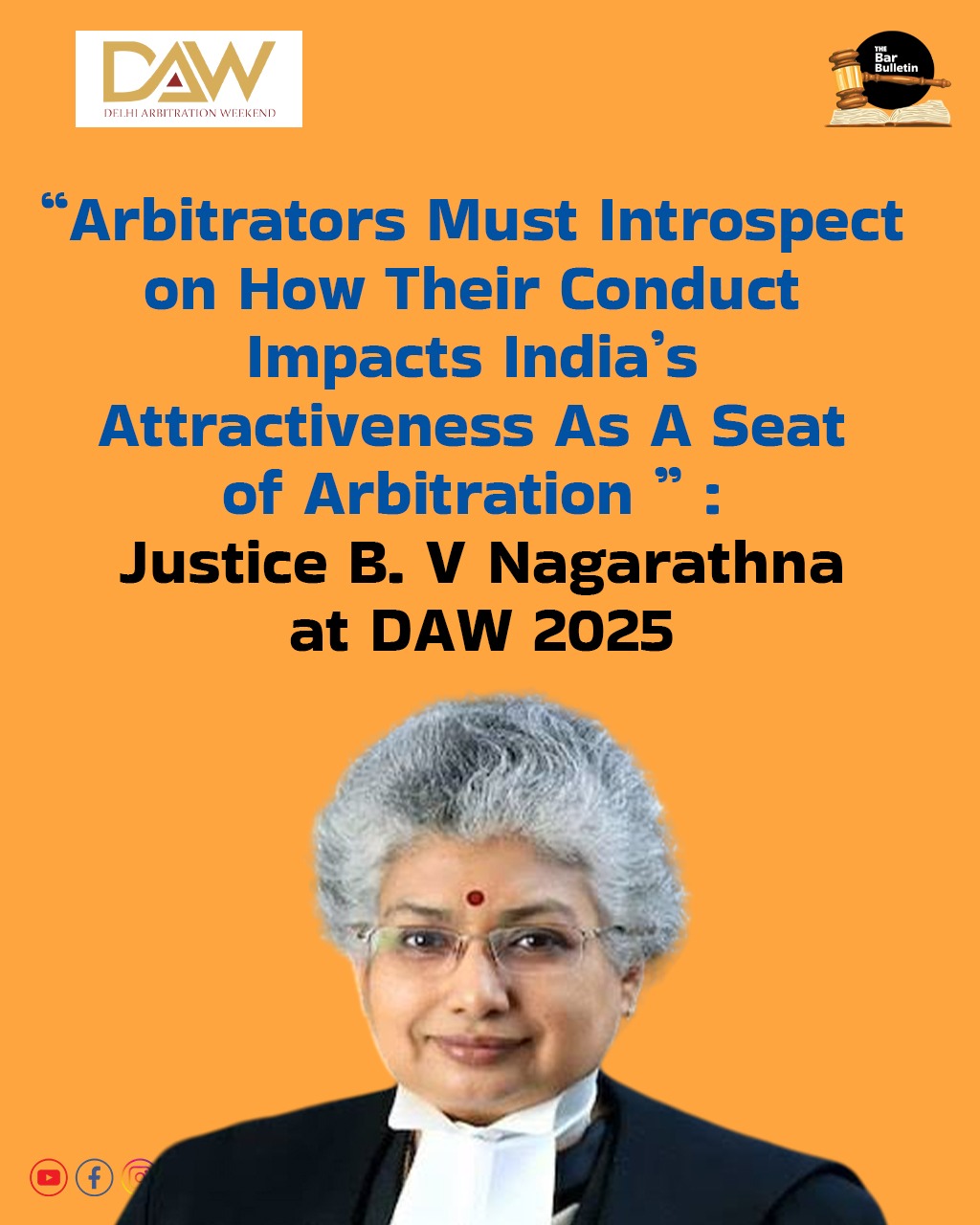The second session on the third day of lecture sessions at DAW 2025 dealt with the topic – “Seats of the Future: Actionable Steps for Enhancing the Indian Arbitration Ecosystem”. The event was organised by the Delhi High Court in collaboration with the Delhi International Arbitration Centre (DIAC) and hosted jointly with the Supreme Court of India. The session was chaired by Justice B.V. Nagarathna, Judge, Supreme Court of India, and featured distinguished speakers: Justice Nikhil S. Kariel, Judge, Gujarat High Court, Justice Michael Black KC, DIFC Courts, Dr. S. Muralidhar, Former Chief Justice, Orissa High Court, Mr. David Quest KC, Barrister, 3 Verulam Buildings. The session examined actionable measures to strengthen the Indian arbitration ecosystem, focusing on making India a preferred seat for international arbitration and addressing emerging challenges in technology-driven disputes.
Justice B.V. Nagarathna emphasised that India has the potential to emerge as a premier seat for international arbitration, but achieving this requires a multi-faceted approach. Justice Nagarathna highlighted that India must focus not only on legislation but also on judicial support, institutional robustness, professional excellence, and the integrity of arbitrators. She further opined that excessive judicial intervention has been a significant barrier, and while courts must retain limited oversight, arbitration should be treated as a parallel and independent mode of dispute resolution.
Justice Nagarathna underscored the critical role of arbitrators in strengthening India’s arbitration ecosystem. She observed that “High-quality awards directly reduce the necessity for judicial intervention, and arbitrators themselves must introspect on how their conduct impacts India’s attractiveness as a seat of arbitration.” Justice Nagarathna urged arbitrators to act with fairness, ethics, and independence, ensure timely disclosure of conflicts of interest, adhere to natural justice principles, maintain confidentiality, and author awards that are well-reasoned and tailored to each case. She also stressed the need for a formal code of conduct for arbitrators to reinforce transparency, accountability, and professional standards.
In addition, Justice Nagarathna highlighted diversity and inclusivity as crucial elements for a thriving arbitration ecosystem. “Arbitration should not be limited to retired judges or established names; specialists, including non-lawyers, should contribute to technically complex, sector-specific arbitrations,” she stated. Justice Nagarathna called for greater participation of women and younger professionals to broaden the pool of arbitrators and foster innovation. Justice Nagarathna also addressed the importance of institutional arbitration, promotion of mediation, adherence to timelines, cost-efficiency, and continuous professional development. She concluded optimistically, affirming that with collective efforts, India can achieve its vision of becoming a globally recognised “seat of the future” for arbitration.
Justice Nikhil S. Kariel discussed the structural hurdles in the Indian arbitration framework, including the dominance of ad hoc arbitration, delays, enforcement issues, excessive judicial intervention, and concerns over arbitral quality. Justice Kariel proposed remedies such as institutionalisation of arbitration, standardised training for arbitrators, minimal judicial interference, accelerated procedures with strict timelines, and reforms to enforcement and appellate mechanisms. Justice Kariel emphasised that judicial restraint must respect party autonomy, intervening only when necessary. He observed, “Judicial intervention should be guided by party autonomy, stepping in only when absolutely necessary.” Justice Kariel also highlighted the importance of systematic reforms, noting, “India’s arbitration framework must evolve through institutionalisation, training, and streamlined procedures to attract international confidence.”
Mr. David Quest KC addressed disputes arising from digital assets, smart contracts, blockchain, and AI, highlighting the need for arbitrators to be technologically fluent. Mr. Quest discussed unconventional corporate structures, decentralised autonomous organisations, and drew on the UK Jurisdiction Task Force’s Digital Dispute Resolution Rules to illustrate how condensed timetables and flexible procedural design empower tribunals. Mr. Quest suggested these approaches could inform the development of India’s arbitration framework. Further, he observed that, “Arbitrators must understand emerging technologies to effectively manage disputes in the digital age.” He added, “Condensed timetables and flexible procedures can empower tribunals without compromising fairness.”
Dr. S. Muralidhar stressed that India must first improve domestic arbitration to naturally attract international cases. Highlighting the challenges of a generalist legal system, he advocated for professional discipline, trust among counsel, and the development of a specialised arbitration bar to enhance the quality and efficiency of domestic awards. Dr. Murlidhar noted, “The quality of domestic arbitration hinges on disciplined counsel and specialised practices suited to arbitration, not litigation.” He further remarked, “Building trust and professional rigor in domestic arbitration is key to attracting global confidence.”
Justice Michael Black shared practical insights on specialised courts for technology disputes. Justice Black emphasised that flexible procedures tailored to the dispute are essential to accommodate tokenisation, pseudonymity, and digital autonomous organisations, noting that rigid procedural codes are insufficient for modern technology-driven disputes. He observed, “Specialised courts with adaptable procedures are crucial for resolving technology-driven disputes effectively.” He added, “Rigid codes of procedure cannot address the complexities of blockchain, AI, and digital assets.”
While concluding the session, Mr. David Quest KC suggested blockchain could enhance the security and accessibility of arbitration records. Whereas, Justice Michael Black emphasised the need for specialised courts with adaptable procedures. Lastly, Dr. S. Muralidhar highlighted the importance of data collection and professional conduct, noting that domestic arbitration quality depends on disciplined counsel and arbitrators adopting practices suited to arbitration rather than litigation.



